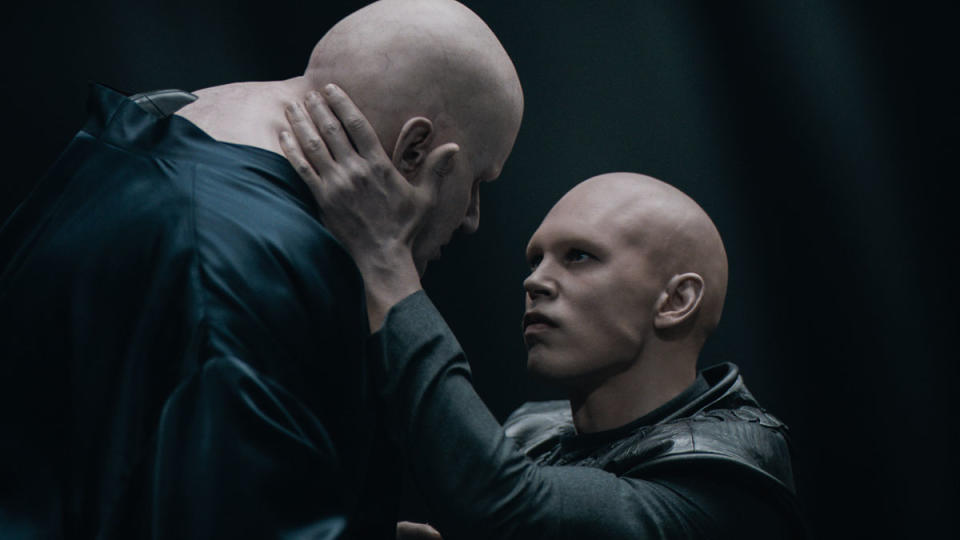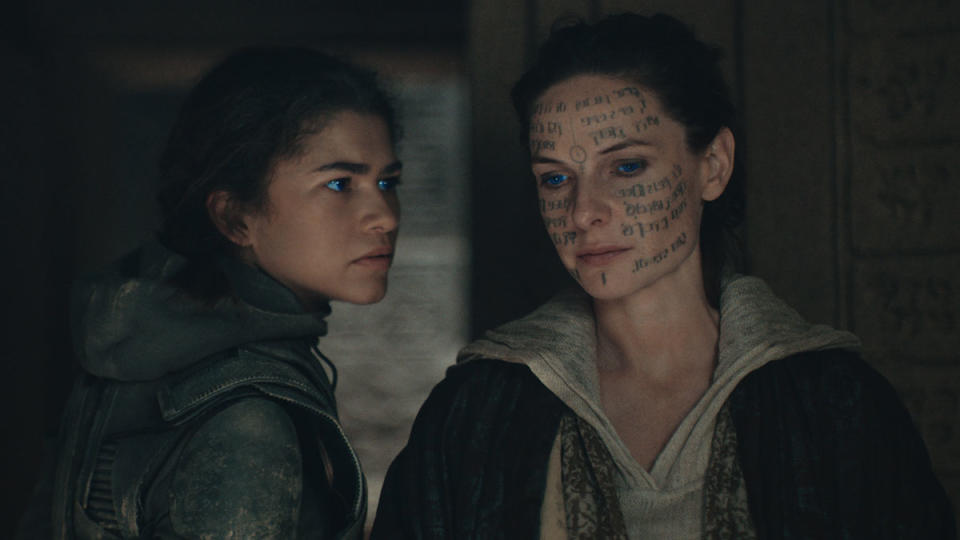Dune: Part Two Is Weirder, Wilder, and Crying Out for a Sequel: Review
- Oops!Something went wrong.Please try again later.
- Oops!Something went wrong.Please try again later.
- Oops!Something went wrong.Please try again later.
- Oops!Something went wrong.Please try again later.
The post Dune: Part Two Is Weirder, Wilder, and Crying Out for a Sequel: Review appeared first on Consequence.
The Pitch: It’s been two and a half years since the first Dune film brought us to a faraway future on the desert planet Arrakis. That’s the world where, as you might remember (two and a half years is a long time!), a young man named Paul Atreides (Timothée Chalamet) and his mother Jessica (Rebecca Ferguson) survived a devastating attack on their family, thanks to a power grab orchestrated by Baron Vladimir Harkonnen (Stellan Skarsgård) and his family.
Escaping into the desert, Paul and Jessica were able to form an alliance with a tribe of Fremen (the natives of Arrakis), an alliance seemingly foretold by Paul’s visions of a young Fremen warrior named Chani (Zendaya). Dune: Part Two picks up right after the events of the first film, as Paul learns the ways of the Fremen and grows closer with Chani.
Yet the action expands far beyond one planet, as Emperor Shaddam IV (Christopher Walken) and his politically savvy daughter Princess Irulan (Florence Pugh) contend with the political shifts following the presumed end of the House of Atreides, while the Harkonnen clan attempts to restart Arrakis production of that most valuable element — spice. The bad news for the Harkonnens is that the Fremen have become even more dedicated to destroying their attempts to collect spice, especially with Paul gaining a religious following amongst them…
There Is Beauty In the Desert: Hooboy, it’s easy to forget just how much is going on in a Dune movie until you attempt to summarize it. Director Denis Villeneuve’s follow-up to the Oscar-winning epic probably requires a rewatch of the first film (now streaming on Max or Netflix) in order to properly prepare, because even with a runtime of two hours and 46 minutes, there’s no time for recapping what came before — not with a half-dozen new characters and a whole messianic ascent to follow.
In so many ways, Part Two takes what Villeneuve did with Part One and expands upon it, bringing that same sense of epic grandeur to the storytelling as well as its visual craft. In the year 2024, the memory of feeling awe over a filmmaker’s choices can be a dusty one, especially in genre storytelling. Yet somehow Villeneuve does it again, with Greig Fraser’s rich painterly cinematography and top-notch VFX creating new and dazzling visual spectacles. Even something as simple as Harkonnen foot soldiers eschewing gravity to leap atop a rock formation stands out as magical.
The true hero of the Dune films, though, is costume designer Jacqueline West, whose work here features some breathtaking pieces of craftsmanship (like, as one example, literally everything worn by Florence Pugh’s space princess). More importantly, West’s attention to detail gives a grounded feel to everything worn on screen, especially the various types of suits worn to survive on Arrakis, hard-selling the audience on the idea that everything is real. Dune could easily feel like over-the-top costume drama, but the costumes being so damn good is somehow, paradoxically, why it doesn’t.

Dune: Part Two (Warner Bros.)
Personal Jesus: There’s a reason why the Dune books, despite the devoted fan base they’ve accrued over the years, have been a near-insurmountable challenge for filmmakers to adapt: Like many mid-20th century science fiction tales, they’re oftentimes fundamentally weird, packed with big swings and wild moments layered on top of your standard Hero’s Journey tropes. A factor in Villeneuve’s success with them is that he leans hard into that weirdness; the screen time he devotes to the particulars of a Fremen burial ritual or the peculiar technology of the year 10,191 or the politicking of the Bene Gesserit is given as much importance as the (immaculately presented) battle sequences.
That devotion to the source material contributes to some of the movie’s most exciting choices, like giving Austin “For Once I Don’t Sound Like Elvis” Butler a War Boy makeover (with fewer cancerous tumors and more sexy malevolence). The catch is that you can’t be a faithful adaptation of Frank Herbert’s writing without adapting all of it. Late into Part Two, Chani tells Paul that “The world has made choices for us,” a line that almost feels like a meta-commentary on the fact that so much imagination and creativity and painstaking work has been utilized for a film that cannot escape the white savior narrative embedded in the source material.
The film’s casting choices — white-presenting actors representing off-worlders, while primarily people of color play Fremen — underline this, even while occasionally attempting to push back on the Paul-as-Jesus angle. (Paul even attempts at one point to argue that “Arrakis must be freed by its own people.”) Yet this self-awareness does not pay off in the form of actual rebellion against the original novel’s plotting; once a messiah story, always a messiah story.
And guess what? The next book in the Dune series that would be adapted, should this franchise continue, is literally titled Dune: Messiah. Being able to predict the future doesn’t mean you can escape it.
Destiny’s Pawns: It’s tempting to crack a joke about how the true stars of Part Two are the sandworms, which get much more of a spotlight in the second part. (How does one ride a sandworm? Get ready to find out!) Yet the human ensemble is impressive — while the cast expands a bit for Part Two, it never feels too ungainly. And while Timothée Chalamet is still recognizably the boyish Paul from the first film at the beginning, he accelerates his protagonist into adulthood quickly, without it ever feeling forced or fake — and his ascension into action hero is relatively complete.
In terms of newcomers, Austin Butler does deliver the necessary menace as a powerful new threat. But the casting of Christopher Walken unfortunately proves more distracting than anything else; his presence on screen is as powerful as ever, but his signature delivery feels out of joint in this context — there are a lot of well-known actors in these films, but Walken is the only one who feels truly out of place.

Dune: Part Two (Warner Bros.)
Meanwhile, this is a franchise surprisingly rich with interesting female characters, though as Chani, Zendaya doesn’t get much opportunity to stretch beyond the confines of tough but loyal love interest, and Florence Pugh’s role is limited to brief scenes of palace intrigue (it’s all very Shakespearean or Game of Thrones-y). Standing out most prominently is Rebecca Ferguson’s transformation from loving mother into powerful mystic, as she gestates Paul’s unborn sister and figures out how to secure a foothold for her son in this turbulent world. Most of Part Two’s most engaging moments are its strangest, and Ferguson is often at the center of those.
The Verdict: If your biggest complaint about Dune: Part One was that it felt like just the beginning of the story, and you were looking forward to Part Two as a chance for some closure… No spoilers, but I regret to inform you that the ending of Part Two cries out for a Part Three — it’s not a completely unresolved ending, but there’s clearly more story to be told.
Fortunately, Villeneuve wants to keep going, and Part Two wasn’t greenlit until after the release of Part One, so the dream of a Dune trilogy is far from dead. Still, calibrate your expectations, and prepare for the same lack of resolution you might remember from watching last year’s Spider-Man: Across the Spider-Verse or Mission: Impossible — Dead Reckoning.
As frustrating as that can be, it’s inspiring to imagine another sumptuous sci-fi epic coming in a few years, told in a serious and considered, but never dull, way. The story may never break free of its more dated tropes, but the Dune movies represent a remarkable collection of talent coming together to, if nothing else, remind us of the power of epic storytelling on a big screen. “Desert power,” at least in Villeneuve’s hands, is a very real thing indeed.
Age Verification
Are you 18 years of age or older ?
Buy Now from Consequence Shop
Where to Watch: Dune: Part Two dreams of rain in theaters beginning March 1st.
Trailer:
Dune: Part Two Is Weirder, Wilder, and Crying Out for a Sequel: Review
Liz Shannon Miller
Popular Posts
Post Malone and Eddie Vedder Perform "Better Man" and "I Won't Back Down" Together: Watch
Machine Gun Kelly Gets "Spiritual" Blackout Tattoo on Upper Torso
The Flaming Lips to Perform Yoshimi Battles the Pink Robots on 2024 Tour
Brian Wilson Suffering From Dementia, Placed Under Conservatorship
Distributor Is Removing Kanye West's New Album from Streaming Services

